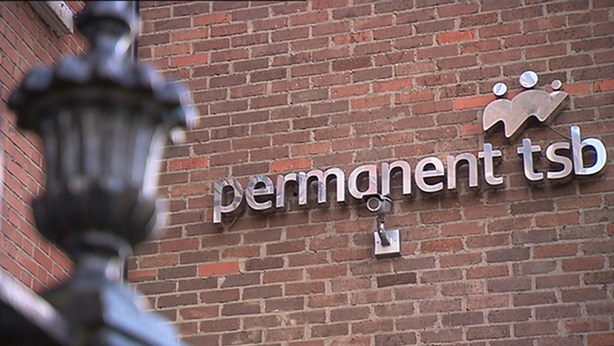The former CEO of Permanent TSB, David Guinane, is being "singled out", a Central Bank inquiry into his alleged participation in suspected regulatory breaches by the bank related to its treatment of tracker mortgage customers has been told.
The inquiry also heard that Mr Guinane thinks there was no contravention by the bank, that if there was he did not participate in it and that it is unfair that the inquiry is taking place in 2024, when it is alleged that the contravention happened in 2009 and 2010.
In his opening statement to the inquiry, Senior Counsel Paul McGarry for Mr Guinane, described the inquiry as "truly extraordinary" and clearly without precedent.
He said more than 15 years have passed since the core matters that are being investigated by the inquiry had occurred and the issue at question centres around a three word email sent by his client in January of 2009 that read, "Ok with that".
Mr McGarry said it was apparent from those words that in his actions, Mr Guinane had been acting on a recommendation put together by others, who are not being pursued by this inquiry.
Instead, he said, Mr Guinane is being singled out.
He added this is the first time that an individual from any bank has been pursued in relation to the tracker mortgage issue, which effected many banks.
Mr McGarry said it is not unknown for people to be made a scapegoat or the face of something, but just because it happens it does not make it right.
He added that the misconceived nature of the claims will clearly emerge as the inquiry delves into the issues.

The senior counsel also told the inquiry that nobody asserts there was deliberate wrongdoing by Mr Guinane or by PTSB.
He said his client had an impeccable 35-year record in banking and had never been the subject of customer complaint, inquiry, investigation or adverse finding or anything resembling criticism from regulatory authorities in Ireland and the UK.
He added that Mr Guinane has asked for the inquiry to take place in public in order to clear his good name.
David Guinane worked for PTSB for two and a half decades and served as chief executive of the bank between 2007 and 2012.
He and PTSB were given notice of the inquiry in 2021 after the Central Bank determined it had reasonable grounds to suspect that Mr Guinane had participated in the commission of a prescribed contravention by PTSB between January 2009 and April 2010.
In his opening statement today, the inquiry's sole member Peter Hinchcliffe said during the period PTSB decided to apply, or decided to continue to apply, an interest rate for tracker mortgage customers coming off a temporary fixed rate that was less favourable unless the customer raised specific queries about the new rate.
"The Central Bank suspects that PTSB treated those customers who did not complain about the tracker rate that was applied after the fixed rate period, unfairly and contrary to their best interests when compared to those that actually complained i.e. by only giving the more favourable tracker rate to those who complained or queried," Mr Hinchcliffe said.
"The Central Bank suspects that this was a breach of General Principle 1 of the Consumer Protection Code 2006 which required PTSB to, amongst other things, 'ensure that in all its dealings with customers and within the context of its authorisation it acts honestly fairly and professionally in the best interests of its customers and the integrity of the market,'".
He added that the Central Bank suspects that Mr Guinane, while CEO, participated in the bank's breach of the Consumer Protection Code 2006.
Delivering the opening statement for the Legal Practitioner Team supporting the inquiry, Senior Counsel John Breslin said it will first have to make a finding about whether PTSB breached the Consumer Protection Code and if it did, whether Mr Guinane participated in that.

He said much of the focus will be around the question of the meaning of a special condition, known as 706, which was contained in the mortgage contracts of some PTSB customers dating back to 2004.
He said at question was where a tracker mortgage customer was coming off a temporary period on a fixed rate, did their contract containing the condition require them to be put back on the original tracker rate they had, or the prevailing tracker rate being offered by PTSB at the time?
He added that for a significant cohort, the margin was lower on their original tracker rate than the one that was being offered when they came off the fixed rate.
So if those customers were not put back onto their original tracker rate, they would pay more over the lifetime of the mortgage.
He said that after queries began coming into the marketing department from customers about the issue, the bank sought legal advice.
On foot of that a proposal was then put forward by the marketing department whereby tracker customers on a temporary fixed rate would be given the option to go back to their original tracker rate, if they contacted the bank about the issue.
Mr Breslin said this proposal was sent to Mr Guinane by then head of marketing, Niall O'Grady, in an email and on January 19 he responded, "Ok with that".
Mr Breslin added that after PTSB continued to receive complaints and had engagement with the regulator, it subsequently reconsidered the situation and began to remediate the issue in 2010.
He also confirmed that it is neither suspected nor alleged that Mr Guinane nor PTSB acted dishonestly.
Mr Breslin also told the inquiry that PTSB is claiming legal privilege over the content of legal advice that forms part of the background to decisions made in January 2009.
He said a limited waiver agreement had been entered into to allow it to be made available to the Central Bank, but any discussion of it can only be held in private.
Around a dozen witnesses are scheduled to give evidence in public at the inquiry over the next three weeks, including Mr Guinane.
In 2019, Permanent TSB was fined €21m by the Central Bank under its Administrative Sanctions Procedure for what were described as "serious failings" around 2,007 tracker mortgage customers between August 2004 and October 2018.
Central Bank inquiries have the power to impose a range of penalties on individuals if they are ultimately found to have committed the prescribed contravention to which the inquiry relates.
These include a caution or reprimand, a fine of up to €1m and/or disqualification from being allowed to manage a regulated financial service provider for a period.







